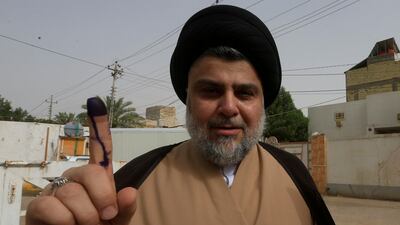Last Saturday, Iraqis took to the polls in the country's national elections, which followed years of suffering under ISIS. A degree of optimism was beginning to move through parts of the country. The Sairun bloc, led by influential cleric Moqtada Al Sadr, has, however, shocked observers by emerging as the frontrunner.
Mr Al Sadr's Sairun coalition came out on top in six provinces out of 19 and took second place in four others. Meanwhile, the favourites entering the elections, Prime Minister Haider al-Abadi's Victory Alliance only managed to come first in the northern province of Nineveh, which was liberated by Iraqi forces from ISIS militants at the end of last year. The Fatah Coalition led by senior figures from the Popular Mobilisation Units (PMU) also under-performed, winning only four provinces.
Preliminary results suggest that Sairun has obtained 54 seats, the most out of all the other political blocs, followed by the Fatah Coalition, which earned 47 seats and Mr Al Abadi’s coalition, which won 43 seats. Meanwhile, Nouri Al Maliki suffered the biggest drop in support, with his State of Law Coalition dropping from 92 seats in 2014 to 25 seats this year.
Perhaps most encouragingly, these results do at least suggest we are witnessing the beginning of the end of sect-based identity politics in Iraq.
This hope is not surprising, given the cross-sectarian nature of the leading political coalitions, such as the Victory Alliance, which actively campaigned and engaged in Sunni-majority and Kurdish areas, along with the cross-sectarian and non-Islamist Sairun bloc, led by Mr Al Sadr.
The victory of Mr Al Sadr’s non-sect based party suggests the country wants to move away from sect-based identity politics towards a politics that focuses on civil and national issues.
Mr Al Sadr made a concerted effort to appeal to marginalised and disillusioned Iraqis while styling himself as a reformist leader determined to effect comprehensive change to a failing political class.
His journey is an interesting one and many are watching where his sentiments may go next. The result, therefore, was a resounding message that Iraqis are seeking political change.
Despite this, there is still a long way to go for Iraq. There appears to have been a low turnout on Saturday, with Riyadh Al Badran, the electoral administration chief of the Iraqi Independent High Electoral Commission (IHEC), indicating turnout was just 44 per cent.
The decline in voter turnout perhaps reflects the widespread dissatisfaction that many Iraqis still feel towards the current Iraqi political class. Endemic corruption along with a complete lack of effective governance affected confidence in voters that the elections would deliver a government that could provide job opportunities and public services.
In the Kurdistan region, there were also widespread reports of electoral fraud, with the four major opposition parties all calling for re-elections.
We also cannot deny that there remain a number of intrasectarian fragmentations in Iraq’s current political climate and there is, as yet, no obvious outcome for government formation in the country.
Although, the prime minister’s statement in the aftermath of the vote indicated his bitter disappointment at the result, he might still have a chance to earn a second term to his premiership.
Many members of the Sairun bloc have suggested that Mr Al Abadi’s coalition is the closest one to them, indicating the possibility of a Sairun-Nasr alliance, which could allow Mr Al Abadi to still lead a government, albeit one dominated by Sadr loyalists.
This coalition could be buttressed further with the inclusion of Ammar Al Hakim’s Al Hikma Movement, which won 19 seats according to preliminary results.
Given the fact that the Al Hikma Movement was already part of Mr Al Abadi’s alliance until just a few months ago, its return to form a government coalition with the Victory Alliance is a likely possibility.
Regardless of the outcome of the negotiations that are bound to take place, this election has shaken Iraqi politics to the core and represents a categorical rejection of the current political class and the status quo in the country.
This sentiment, which characterises Iraqis’ attitude towards the country’s politics, has allowed populism in the form of Mr Al Sadr’s bloc to take the elections by storm. This places him in a unique position as kingmaker as negotiations get underway for the formation of Iraq’s government.
Amid all the political amalgamations and formulations, the results should act as a wake-up call for political elites that Iraqis want an emphatic move away from sectarianism. They suggest Iraqis increasingly want to move towards civic-based politics that encompass people regardless of their background and sect.
In order to truly reverse the apathy felt by some Iraqis, the government – and whoever becomes prime minister – must actively break down sectarian barriers while engaging with young people. After all, they make up the bulk of the electorate. This can be done by supporting and promoting civil societies and empowering young people, thereby giving them a stake in the country's future.
By doing so, the Iraqi government could preserve and enrich Iraq’s fledgling democracy and political process and nurture a vibrant civic society while supplementing the renewed sense of nationalism that has followed the defeat of ISIS.
Mohammed Al-Jumaily is an expert analyst on the Middle East and North Africa region at Integrity UK counter-extremism research group

